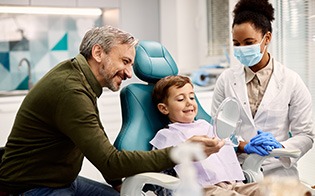Emergency Kids’ Dentistry – Buffalo Grove, IL
Accidents Happen, & We’re Here to Help!
Same-day emergency care is just a phone call away if the unexpected happens to your little one. Whether they’re experiencing a painful toothache, have accidentally knocked out their tooth, or have lost a filling, Dr. Capezio has many years of experience in providing fast and effective treatment. Our front desk staff can also walk you through first-aid recommendations on the phone! Don’t wait to contact our dental office if you find yourself in need of urgent dental care, and we'll be happy to offer emergency kids' dentistry in Buffalo Grove, IL for your child.
Why Choose Capezio Pediatric Dentistry for Emergency Kids’ Dentistry?
- Same-Day Emergency Dental Appointments
- Dental Insurance Welcome
- Trusted by the Community
How We Treat Dental Emergencies

You can trust us to get your child out of their dental pain as quickly as possible. Here’s what we do when you call us to report a dental emergency:
- Same-Day Appointment: We’ll ask about your little one’s situation and give you any necessary first-aid instructions. Then we will schedule a same-day emergency appointment so that your child can get the care they need.
- Emergency Exam: We’ll carefully examine your child’s mouth; we will need to narrow down what’s causing the problem so that we can treat it appropriately.
- Review Findings: Once our examination is complete, we will share the results with you. We’ll then work with you to create a treatment plan, making sure that you understand the costs involved.
- Get the Care Your Child Needs: Regardless of what kind of emergency your child is suffering from, we’ll take whatever steps are necessary to stop their discomfort and protect their oral health.
The Most Common Pediatric Dental Emergencies
If you have any reason to think that your child might need emergency dental care, you should get in touch with our team immediately so that we can advise you on your next steps. Below are some examples of common dental emergencies that your child might encounter at some point.
Understanding the Cost of Pediatric Dental Emergencies

It’s very common for parents to have questions about the cost of their child’s care, especially in unexpected situations. Don’t worry – our Buffalo Grove dental team is here to ensure the process of navigating the financial side of their treatment isn’t stressful. At their appointment, we will conduct a comprehensive oral exam before reviewing the treatment options and the associated costs. In the meantime, you can read on to learn more on the topic of price, including why it’s different for everyone.
Every Dental Emergency is Different – Here’s Why

As we mentioned above, the price isn’t the same across the board. That’s because there are a number of factors we need to consider, including what procedure they need to restore their oral health, whether they require follow-up appointments, and many others that we’ll discuss during their examination. Once we’ve had a chance to examine the situation and map out a treatment plan, we’ll discuss the cost with you along with the financial options available.
Does Dental Insurance Cover Pediatric Dental Emergencies?

The good news is that many dental insurance providers cover a portion of the cost. So, don’t just assume you’ll have to pay for the entire cost of your child’s emergency dental care out-of-pocket. We’re proud to work with several of the nation’s leading providers as well (including Cigna, Delta Premier, and United Concordia), so don’t hesitate to ask us for assistance when it comes to utilizing your benefits. We’d be happy to answer any questions you have so that process is as easy as possible.
How Taking Care Of Your Child’s Smile Can Save You Money

Remember, common oral health problems, like tooth decay, won’t go away with time. In fact, they only get worse. That’s why it’s crucial that you bring your child in for an emergency exam when they first mention that something is wrong – whether it’s a dull, persistent toothache or a sharp, stabbing pain when biting down. This ensures that we can quickly pinpoint and treat the root of the problem before more extensive care is needed.
It’s also important that we mention here that your child should be brushing and flossing consistently at home. Although they may fight it, habits like these are crucial when it comes to preventing common oral health issues, including cavities. In other words, if you want to lower your child’s risk of experiencing a painful dental injury, do your best to reinforce good habits at home.
Keys to Preventing Pediatric Dental Emergencies

If you want to help your child prevent dental emergencies in Buffalo Grove, there are a few things you should know. First, good oral hygiene habits should begin early on in life. If your child learns how to properly brush and floss as well as what they can do to minimize their risk for injury, they can expect to enjoy a happier, healthier smile for the rest of their life. Second, seeking treatment for an injury should be done sooner rather than later, as waiting too long will only result in worsening problems.
Keep Your Child’s Regular Dental Appointments

Children should have their first dental appointment scheduled by the time their first tooth erupts or before they reach the age of one. This allows our team to not only establish a relationship with you and your little one early on, but we can get a baseline for your child’s oral health. We can also begin working on good oral hygiene habits at home. Starting these appointments early in life helps to set your child up for future success. From that point on, we will want to see your child every six months for a regular checkup and cleaning.
Make Sure Your Child is Brushing and Flossing

Brushing and flossing are necessary components of any good oral hygiene routine. Because children are still learning, you must work with them to properly clean their teeth and get to those hard-to-reach areas. Until your child reaches the age of two, they should only use a smear of toothpaste (the size of a grain of rice). Once they turn three, you can begin to increase it to a pea-sized amount (as long as they can spit). As soon as you notice their teeth touching, you can start helping them to floss in between their teeth to remove plaque and bacteria that can cause decay and gum disease. If necessary, you can use a flossing aid to make this process easier.
Be Mindful of What Your Child Eats

It’s natural for kids to have cravings for sugary and starchy foods; however, too much of these is a bad thing, no matter your age. This is why it’s important that you monitor your child’s eating habits and make sure they’re consuming plenty of fruits, vegetables, leafy greens, lean proteins, and dairy. Fruit juices and sports drinks also contain a lot of sugar, which is one of the many contributors to cavities. Instead, swap out these beverages for water, which will help keep them hydrated while ensuring their salivary glands continue working properly. As a result, they’ll avoid serious decay and possible infection.
Give Your Child a Mouthguard

It is believed that children between the ages of 7-10 have the highest number of dental injuries that are sports-related (59.6%). If your child is an avid athlete, one of the most worthwhile investments you can make is a customized mouthguard.
Designed to better protect against unnecessary pressure, a mouthguard fits over the upper arch of teeth to minimize and absorb a hard-hitting impact. It can also be beneficial if your child is prone to grinding and clenching their teeth while sleeping. Worn tooth enamel and jaw pain are common with bruxism, so wearing a mouthguard at night can alleviate these symptoms and improve the status of the smile.
Teach Your Child Not to Open Packages with Their Teeth

As a parent, you may be guilty of opening a package with your teeth. If your child has seen you do this, they’re likely to mimic your actions. Make sure they do not; tooth enamel is strong but not indestructible. Allowing your child to use their teeth to open items will land them in the emergency dental office in Buffalo Grove quickly. Instead, find a pair of scissors or another appropriate tool for the job, and make sure your child’s teeth remain damage-free.
Pediatric Dental Emergency FAQs

If your child has experienced a sudden injury and needs immediate attention, you may be looking for an emergency dentist in Buffalo Grove. At Capezio Pediatric Dentistry, we’re proud to offer safe and effective services when your little one needs them most. We understand you may have several concerns regarding our emergency dental care, which is why we’ve decided to answer some frequently asked questions below. Don’t see what you’re looking for? Feel free to contact our friendly team today!
Should I Take My Child to the Emergency Room First for Dental Emergencies?
Believe it or not, most emergency rooms are not equipped to handle dental emergencies. That’s mainly because they often don’t have a licensed dental professional on staff. You should only take your child to your local ER if they’re experiencing life-threatening symptoms, such as:
- Difficulty breathing and swallowing
- Fractured or broken jawbone
- A serious cut or laceration to the face that causes continuous bleeding
In any other situation, you should bring them to our dental office in Buffalo Grove for a proper oral examination. Our team will take X-rays if needed to identify the root cause of your child’s dental emergency.
Are Knocked-Out Baby Teeth a Dental Emergency?
Since baby teeth are meant to come out eventually, you may think it’s no big deal if they fall out due to an accident. However, they need to stay in the mouth for as long as possible. If your child’s baby tooth gets knocked out, do not reinsert it into the vacated socket, but you should make an emergency appointment with our team as soon as possible so we can determine whether or not your little one needs a space maintainer. Remember – it’s always a good idea to take your child to the ER if their bleeding does not stop or you think they may have damaged their jaw in any way.
Do Chipped Teeth Heal?
Tooth enamel is the hardest substance in the human body. However, it’s unable to heal on its own. That means if your child ever chips a tooth, it will not grow back. The only way to restore the shape and condition of the tooth is with restorative or cosmetic dentistry. If your child has a chipped tooth, you should bring them to our office as soon as you can for treatment. Otherwise, they’re vulnerable to further damage or infection.
What Should I Keep in My Emergency Dentistry Kit?
It’s always a good idea to be prepared for the unexpected, especially as a parent. That said, you should keep an emergency dentistry kit with you at all times that contains the following items:
- Dental floss
- Ice pack
- Your dentist’s contact information
- A topical anesthetic like Orajel
- Dental cement
- Cotton balls
- Sterile gloves
- Petroleum jelly
- Small sealable container
Pediatric Dentistry Adolescent Dentistry Emergency Kid's Dentistry Orthodontic Referrals

